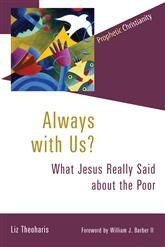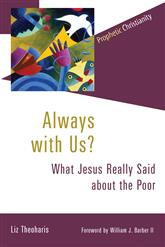Liz Theoharis.
Always with Us: What Jesus Really Says About the Poor.
Grand Rapids: Eerdmans, 2017.
Reviewed by Dr. Jill Firth
“The poor you will always have with you” (Matthew 26:11). This Scripture is the most well known of Bible texts about the poor. It is commonly cited by politicians, preachers, scholars, and well-meaning citizens. Some see the problem of poverty as arising from wrong choices by the poor themselves, an issue of individual sin. Others are committed to charitable works but may not be concerned about systemic injustices. Some cite this text to assert that we should be concerned with Jesus, not the poor.
In his Foreword, William J. Barber II notes that, in America, over 15 million children live in poverty, and 64 million people live at less than the minimum wage, including 54% of African Americans (2015 statistics). A 2011 study from Columbia University estimated that 250,000 Americans died each year from causes linked to poverty. Theoharis adds that while only 4 million tons of food are needed to feed all Americans, 46 million tons of food are thrown away each year in the United States. There are an estimated 10 million homeless people in the US, but more than 12 million empty luxury housing units. She notes that two-thirds of all minimum wage workers are women, and many of these are heads of households.
Old Testament texts frequently bid us to care for widows, orphans, and sojourners (Exodus 22:21-22, 23:6, 9; Leviticus 23:22; Deuteronomy 10:18, 14:29, 15:9, 24:7, 14, 19, 26:12-13, 27:19; Psalms 68:5, 72:4, 146:9; Proverbs 15:25, 22:22; Job 29:12, 31:16; Isaiah 1:17, 23, 10:1-2, 58:10; Jeremiah 5:28, 7:6, 22:3, 16; Ezekiel 16:49, 22:7, 29; Amos 4:11; Zechariah 7:10, see also Mark 12:40; James 1:27). In the Gospels, one out of every ten verses is about the poor, and in James, one verse in every five. We can’t avoid reflecting on what Scripture says about the poor.
In Always with Us, Liz Theoharis also invites us to read the bible with the poor. Theoharis uses a method which is “community based and liberation oriented.” Contextual Bible study draws on methods developed in South Africa, Latin American Liberation Theology, and Christian base communities, and Theoharis builds on Gordon Fee’s guidelines for bible study in New Testament Exegesis (2002). The voices of the poor are often unheard in our reflections on Scripture, and Theoharis invites us to listen to their perspectives and insights. The distinctive of her approach is reading the Bible with America’s poor. She includes transcripts of bible studies that give us the thoughts of the poor in their own words.
Some of the book’s claims are controversial. Chapter 4 argues that Jesus was a poor man, and Chapter 6 that he was the leader of a social movement. Chapter 5 sees the text as “a disruption of imperial systems.” However, other points are very clear. Jesus’ quote of Deuteronomy 15:11 is drawn from a chapter which calls for justice and care for the poor. Deuteronomy 15:4 says, “there should not be any poor among you,” and the chapter outlines the cancellation of debts and generous giving, promising blessing to the community who follow these commands. While we may differ on how to participate in God’s care for the poor, it is incumbent on us as individuals, churches, and society to do so.
This book brings a fresh perspective on dealing with poverty. Allowing the poor a say in how this should be carried out is a sane and practical proposal. Around the world, we are learning from other voices, and the poor, even our own, have a contribution we need to hear and act on.
Jill Firth is Lecturer in Hebrew and Old Testament at Ridley College, Melbourne.





Is this the United States version of Liberation Theology?
Blessed by this, Jill!! So often we are intentionally or unintentionally callous, indifferent to the cries, thoughts, sufferings of the poor. I think God weeps at our lack of real concern.